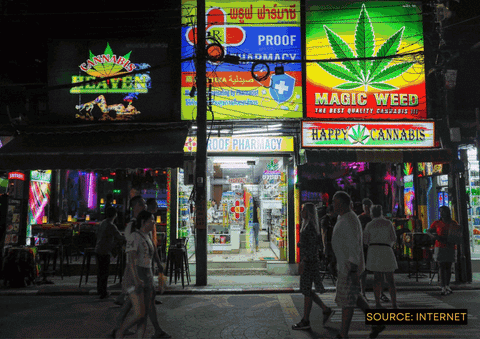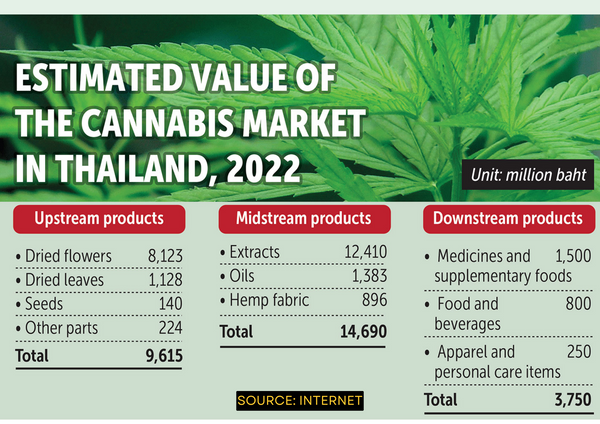Thailand's Cannabis Legalization Journey:

In 2022, Thailand made history as the first Asian country to decriminalize cannabis, allowing its cultivation and trade for medicinal purposes. While medical use was permitted, recreational consumption remained illegal. Foreign tourists were warned against expecting to freely smoke joints, with tough penalties for recreational use, including public smoking. Cafes and restaurants could serve cannabis-infused products with low THC levels. Despite the relaxation, the government emphasized promoting cannabis for medical purposes and discouraged recreational use, especially for foreign visitors. This followed Thailand's 2018 decision to allow medical marijuana, with subsequent loosening of cannabis laws.
This additional context provides insight into Thailand's nuanced approach to cannabis legalization, emphasizing the initial focus on medicinal use and the cautious stance on recreational consumption, especially among foreign visitors. The subsequent loosening of cannabis laws and the emergence of cannabis-infused products in cafes and restaurants contributed to the challenges faced by the government in regulating the cannabis market.
Navigating the Complex Landscape:

The recent proposal by Health Minister Chonlanan Srikaew to ban recreational cannabis use reflects the government's acknowledgment of these issues. The draft bill, with its hefty fines for recreational use, signals a shift towards more stringent regulations. However, the Cabinet's official stance is yet to be decided, leaving room for continued debate and speculation.
Political promises made during the 2023 election campaign further highlight the complex nature of the issue. While major political parties, including the Bhumjaithai Party, pledged to restrict cannabis use to medical purposes, lawmakers like Kalyapat Rachitroj from the Move Forward Party emphasized the need to balance economic benefits with addressing social issues like youth drug abuse.
Divergent Perspectives and Industry Response:

The debate surrounding cannabis legalization in Thailand has been characterized by divergent perspectives. Some argue for a complete ban on recreational cannabis to address societal concerns, while advocates like Chokwan "Kitty" Chopaka attribute the problems to lax enforcement of existing regulations. Rattapon Sanrak, the founder of Thailand's first legal cannabis shop, believes that putting cannabis back on the narcotics list would be impractical given the industry's significant growth.
The economic impact of a potential ban on recreational use raises serious questions. Thailand's cannabis industry, initially hailed as a potential economic boon, now faces uncertainty. Serious investors, licensed shops, and growers have contributed to the creation of a multi-billion-dollar market. The proposed penalties, including substantial fines and potential imprisonment, could jeopardize the thriving industry.
Challenges to a Complete Rollback:
The call for a complete rollback faces challenges beyond the economic impact. Industry insiders argue that the genie is already out of the bottle, with a well-established market and significant public acceptance of cannabis. Moreover, the cultural and historical perspective on cannabis, viewed by some as a traditional herb, complicates the narrative surrounding its complete prohibition.The Impact on Tourism and International Relations:
Thailand's tourism industry, initially boosted by cannabis legalization, is now on the brink of change. Cannabis-friendly tourism, once a significant attraction, may witness a decline if recreational use is banned. This shift could have broader implications for businesses that thrived in the wake of the initial cannabis legalization wave.
The proposed ban could also impact Thailand's relations with countries like India. The nation has been a popular destination for Indian tourists, particularly those intrigued by the legal cannabis culture. A decline in the cannabis-friendly environment might lead to a change in the perception of Thailand among Indians, affecting not only tourism but also potential collaborations and exchanges between the two nations.
Future Considerations and Global Impact:
As Thailand stands at this crossroads, the global community closely monitors the unfolding events. The outcome of Thailand's cannabis experiment will not only shape the nation's domestic policies but also set a precedent for other countries considering cannabis legalization.
The world has seen a trend toward more liberal cannabis laws, driven by changing perceptions, economic potential, and potential health benefits. Thailand's decision on whether to ban recreational use or find a middle ground will be a pivotal moment in this ongoing global conversation.
Conclusion:
Thailand's journey with cannabis legalization, marked by a short-lived fun run, is now at a crossroads. The proposed ban on recreational use reflects the government's response to public concerns and the need for more stringent regulations. The debate continues, with various stakeholders urging a balance between addressing societal issues and fostering a burgeoning industry.The coming weeks will determine whether Thailand will hit the brakes on its cannabis experiment or find a middle ground that accommodates both health and economic considerations. As the nation navigates through this critical juncture, the world watches closely, curious to see the outcome of Thailand's high-stakes gamble on cannabis legalization and how it might reshape the nation's tourism landscape and affect individuals from countries like India.

